Pink lake in Senegal
Categories: Africa
By Pictolic https://pictolic.com/article/pink-lake-in-senegal.htmlThere is a lake in Senegal that is bright pink. It was as if potassium permanganate had been poured into it. The water here is so salty that only one type of microorganism can survive in it - they give this color. For days on end, standing up to their necks in water, local residents scoop salt from the bottom of the lake and pour it into boats. The work is hard labor, but by African standards it is paid tolerably.
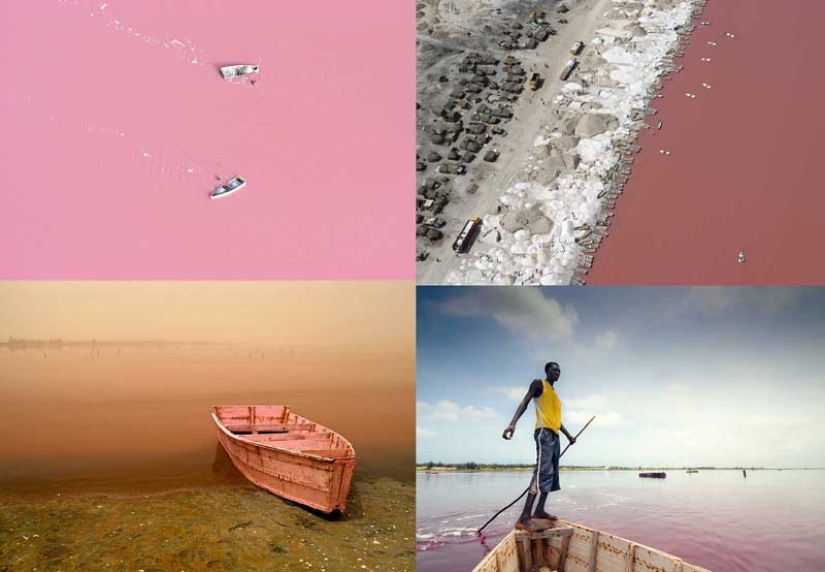
The same car tires are used instead of well logs - there are four such wells in the village. In Europe, this muddy, salty-tasting water would probably not be used even for technical needs, but here they drink and cook food with it - there is no other way. You can hardly see any grazing goats around the village, although Senegalese peasants breed a lot of them. Beans and corn are the main food of salt miners...
The conditions in which African guest workers live can only be described as terrible. But the inhabitants of these shacks themselves treat the squalor that surrounds them as something completely normal. They didn’t come here to live, but to work - from morning to night to extract salt from the Pink Lake, which these strange Europeans admire so much.
 Amazingly colored water and boats, boats... They completely cover the two-kilometer coastline of the Pink Lake, or Lake Retba, as it is called in the language of the Wolof people, the largest ethnic group in Senegal.
Amazingly colored water and boats, boats... They completely cover the two-kilometer coastline of the Pink Lake, or Lake Retba, as it is called in the language of the Wolof people, the largest ethnic group in Senegal.
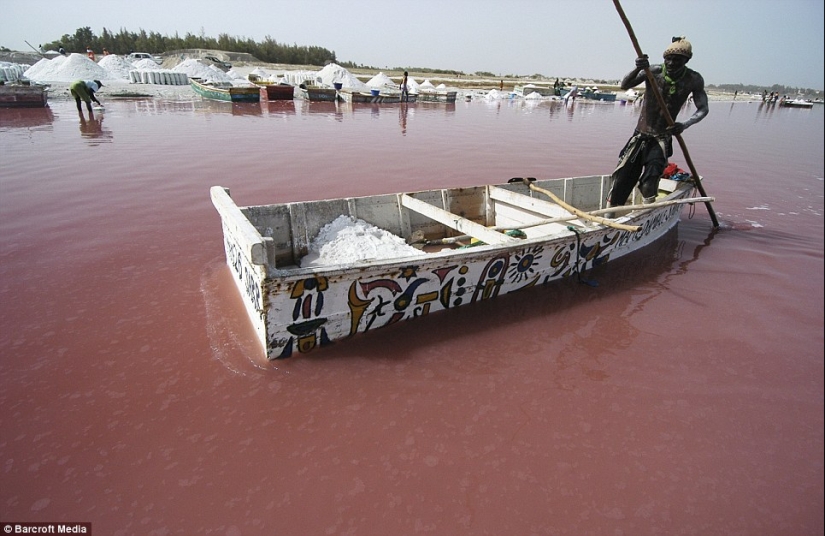 These punts are very similar to our Russian ones. But here they don’t fish, don’t carry hay, and don’t sail to the neighboring village. On this Senegalese lake they serve only to extract salt.
These punts are very similar to our Russian ones. But here they don’t fish, don’t carry hay, and don’t sail to the neighboring village. On this Senegalese lake they serve only to extract salt.
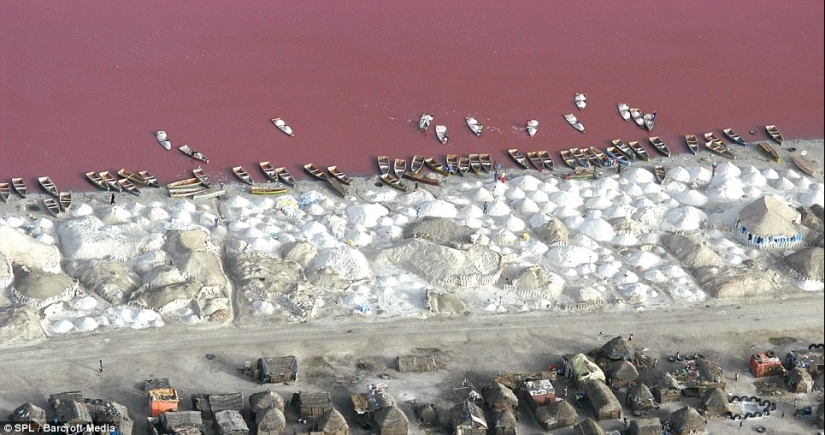 What is now called Lake Retba was once a lagoon. But the Atlantic surf gradually washed in the sand, and eventually the channel connecting the lagoon with the ocean was filled up. For a long time, Retba remained an unremarkable salt lake. But in the 70s of the last century, a series of droughts hit Senegal, the Retba became very shallow and the extraction of salt, which lay in a thick layer at the bottom, became quite profitable.
What is now called Lake Retba was once a lagoon. But the Atlantic surf gradually washed in the sand, and eventually the channel connecting the lagoon with the ocean was filled up. For a long time, Retba remained an unremarkable salt lake. But in the 70s of the last century, a series of droughts hit Senegal, the Retba became very shallow and the extraction of salt, which lay in a thick layer at the bottom, became quite profitable.
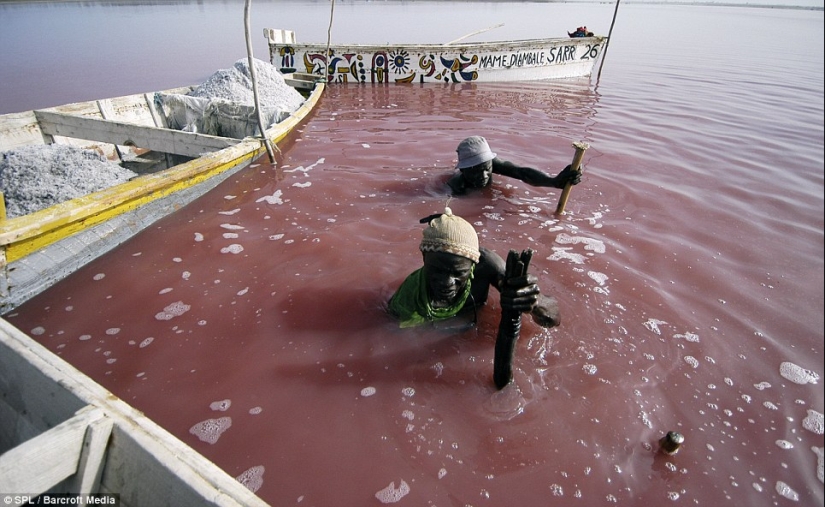 Nowadays people work, standing shoulder-deep in water; twenty years ago they didn’t swim on the Pink Lake, but walked - the water in it was waist-deep. But by extracting about twenty-five thousand tons of salt a year, people are rapidly deepening the lake. In some places its bottom dropped quite significantly - by three meters or more.
Nowadays people work, standing shoulder-deep in water; twenty years ago they didn’t swim on the Pink Lake, but walked - the water in it was waist-deep. But by extracting about twenty-five thousand tons of salt a year, people are rapidly deepening the lake. In some places its bottom dropped quite significantly - by three meters or more.
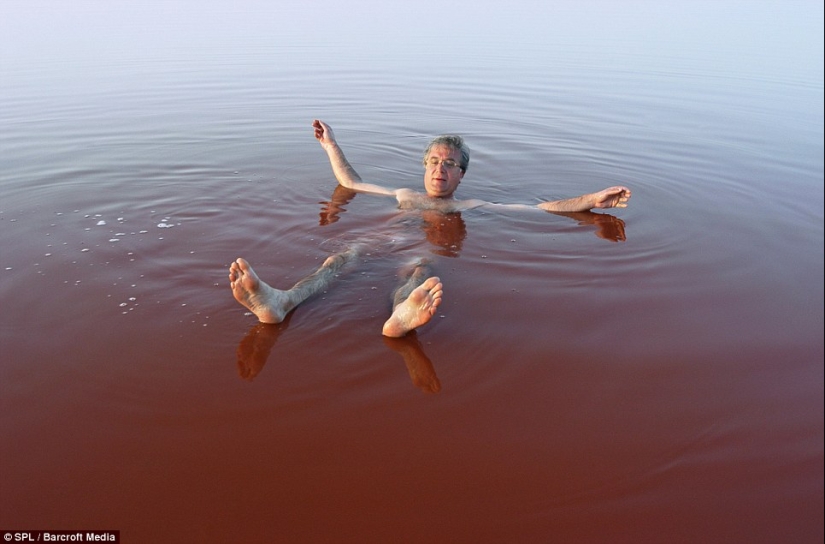 The water in the lake acquired a pink tint thanks to microorganisms that can exist in a saturated salt solution. Apart from them, there is no other organic life in the Retba - for algae, not to mention fish, such a concentration of salt is destructive. It is almost one and a half times higher here than in the Dead Sea - three hundred and eighty grams per liter...
The water in the lake acquired a pink tint thanks to microorganisms that can exist in a saturated salt solution. Apart from them, there is no other organic life in the Retba - for algae, not to mention fish, such a concentration of salt is destructive. It is almost one and a half times higher here than in the Dead Sea - three hundred and eighty grams per liter...
 Microbiologist Bernard Oliver decided to scientifically explain the reason for this unusual color of water. The lake is inhabited by the microorganism Dunaliella salina, which, absorbing sunlight, releases pigment
Microbiologist Bernard Oliver decided to scientifically explain the reason for this unusual color of water. The lake is inhabited by the microorganism Dunaliella salina, which, absorbing sunlight, releases pigment
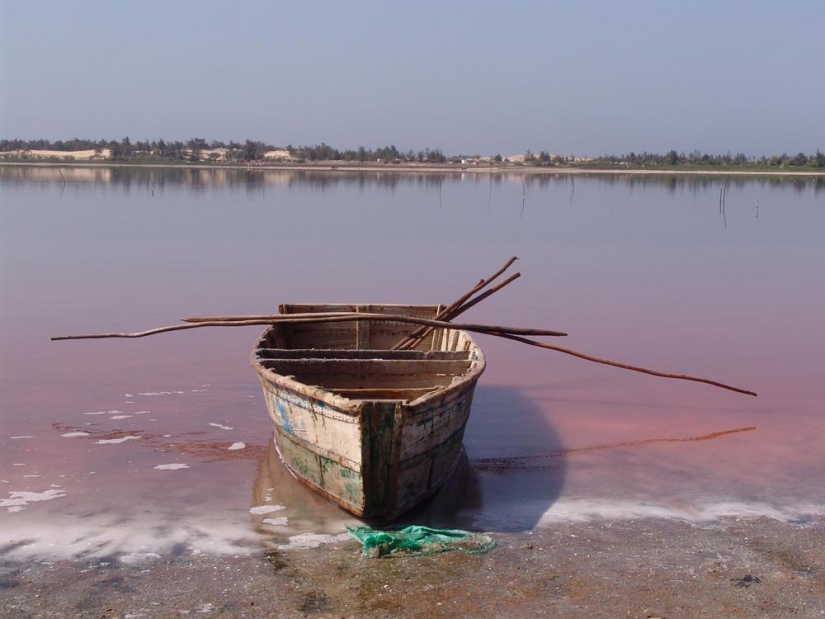 Due to the deepening of the bottom, it will soon be impossible to extract salt in the old fashioned way, and the Senegalese authorities will be faced with the problem of employing the army of miners and traders feeding around the lake. But for now, every morning, dozens of half-naked men, taking simple equipment, swim out to the middle of the lake, anchor the boat and climb into the incredibly salty water...
Due to the deepening of the bottom, it will soon be impossible to extract salt in the old fashioned way, and the Senegalese authorities will be faced with the problem of employing the army of miners and traders feeding around the lake. But for now, every morning, dozens of half-naked men, taking simple equipment, swim out to the middle of the lake, anchor the boat and climb into the incredibly salty water...
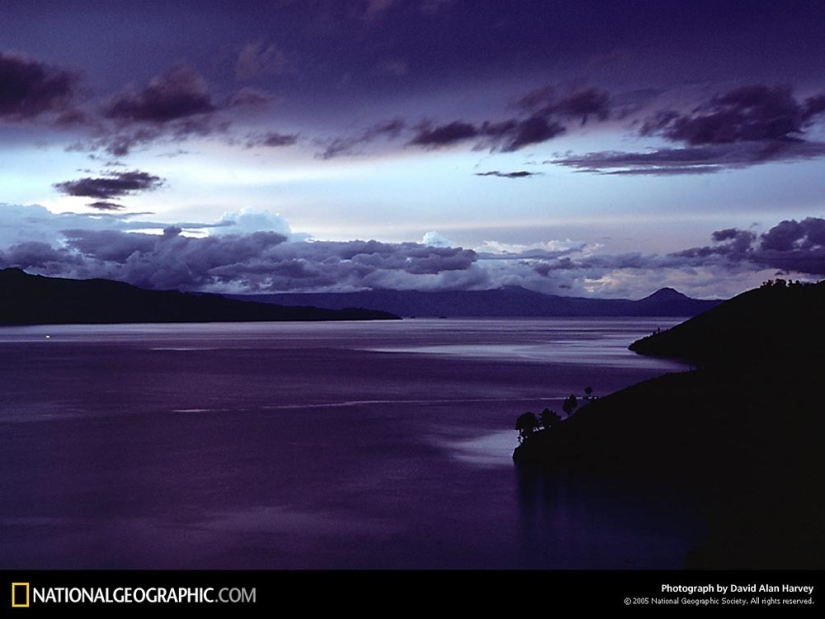 A saline solution of such a concentration can, in just half an hour, corrode the skin to such an extent that poorly healing ulcers form on it. Therefore, before getting into the boat, miners rub themselves with oil. It is obtained from the fruits of the tallow tree, scientifically it is called butyrosperma Parka... It is this oil that makes their bodies shine in the sun...
A saline solution of such a concentration can, in just half an hour, corrode the skin to such an extent that poorly healing ulcers form on it. Therefore, before getting into the boat, miners rub themselves with oil. It is obtained from the fruits of the tallow tree, scientifically it is called butyrosperma Parka... It is this oil that makes their bodies shine in the sun...
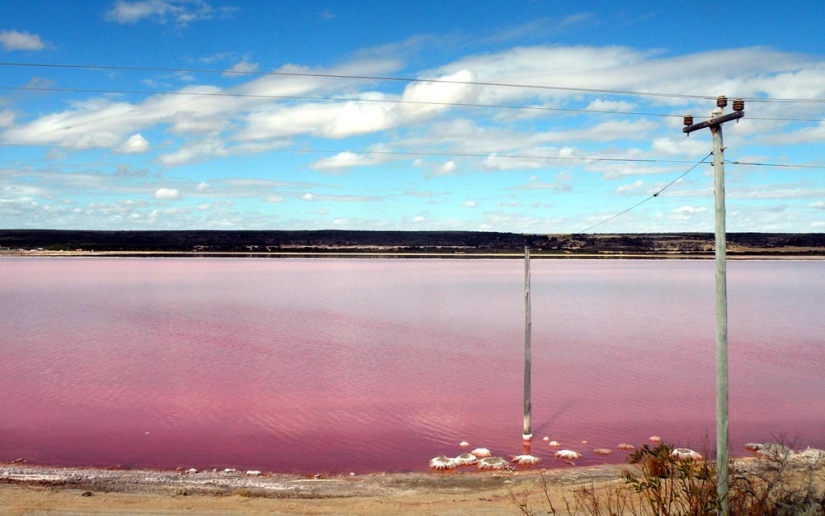 The salt at the bottom is first loosened, then, blindly, placed into the basket under water. From the basket, after allowing excess water to drain, it is reloaded into a boat... It seems that under such a weight the vessel should sink - but the dense salt solution reliably keeps it afloat. The main thing is not to forget to scoop the salt water out of the boat from time to time. To fill such a boat with salt - here it is called a pirogue - it takes a good worker three hours. During a working day, he must deliver three pirogues to the shore.
The salt at the bottom is first loosened, then, blindly, placed into the basket under water. From the basket, after allowing excess water to drain, it is reloaded into a boat... It seems that under such a weight the vessel should sink - but the dense salt solution reliably keeps it afloat. The main thing is not to forget to scoop the salt water out of the boat from time to time. To fill such a boat with salt - here it is called a pirogue - it takes a good worker three hours. During a working day, he must deliver three pirogues to the shore.
 Men extract salt from the bottom of the lake... This is where their participation in the process ends - all further operations are performed by women, often very young, almost girls... They drag the salt in plastic basins to the shore and dump it there to dry. This work is, perhaps, no easier than men’s - a full basin weighs twenty to twenty-five kilograms... But in Africa, few people are concerned with the issues of protecting women’s and children’s labor...
Men extract salt from the bottom of the lake... This is where their participation in the process ends - all further operations are performed by women, often very young, almost girls... They drag the salt in plastic basins to the shore and dump it there to dry. This work is, perhaps, no easier than men’s - a full basin weighs twenty to twenty-five kilograms... But in Africa, few people are concerned with the issues of protecting women’s and children’s labor...
 Freshly mined salt is grayish in color. Therefore, after letting it dry, the women wash and sort it out to remove silt and sand... From small hills, each of which has a sign with the name of the owner stuck in it, the purified salt is poured into common heaps, a three-kilometer ridge stretching along the shore of the Pink Lake... It is in them for a year or two waits for wholesale buyers - during this time the salt, under the rays of the tropical sun, has time to fade and become completely white. The salt that is mined here using such primitive methods is exported to African countries and, as an exotic product, even to Europe. The Senegalese themselves are content with salt obtained industrially from sea water.
Freshly mined salt is grayish in color. Therefore, after letting it dry, the women wash and sort it out to remove silt and sand... From small hills, each of which has a sign with the name of the owner stuck in it, the purified salt is poured into common heaps, a three-kilometer ridge stretching along the shore of the Pink Lake... It is in them for a year or two waits for wholesale buyers - during this time the salt, under the rays of the tropical sun, has time to fade and become completely white. The salt that is mined here using such primitive methods is exported to African countries and, as an exotic product, even to Europe. The Senegalese themselves are content with salt obtained industrially from sea water.
 Wholesalers pay about thirty cents for a fifty-kilogram bag. The pie holds approximately five hundred kilograms. It turns out that for a day of hard labor the worker receives only nine dollars. But by African standards this is good money. Otherwise, guest workers from neighboring countries - Mali, Guinea, Gambia, Upper Volta - would not come to Lake Retba... They usually do not stay here longer than two or three years. Otherwise you can become disabled. The Senegalese themselves look down on visiting workers. They make a living through more skilled work - buying and reselling salt, and as guides and bodyguards they accompany Europeans who come to see the miracle of nature - a lake whose water seems to be stained with blood...
Wholesalers pay about thirty cents for a fifty-kilogram bag. The pie holds approximately five hundred kilograms. It turns out that for a day of hard labor the worker receives only nine dollars. But by African standards this is good money. Otherwise, guest workers from neighboring countries - Mali, Guinea, Gambia, Upper Volta - would not come to Lake Retba... They usually do not stay here longer than two or three years. Otherwise you can become disabled. The Senegalese themselves look down on visiting workers. They make a living through more skilled work - buying and reselling salt, and as guides and bodyguards they accompany Europeans who come to see the miracle of nature - a lake whose water seems to be stained with blood...
 Curious tourists also try to look into the village where salt miners live. It is located right next to the shore. When asked what this place is called, the residents answer: No way, just a village... At least three thousand people live here. There are even cars on the street that are old, like almost all cars in this country.
Curious tourists also try to look into the village where salt miners live. It is located right next to the shore. When asked what this place is called, the residents answer: No way, just a village... At least three thousand people live here. There are even cars on the street that are old, like almost all cars in this country.
 Workers build their dwellings from available materials - reeds growing nearby, plastic film, old tires... To say that such a construction is a shack means to flatter it greatly. However, in the local climate, nothing more capital is required - the houses are designed to protect their inhabitants not from the cold, but from the sun and, at the end of summer - beginning of autumn, heavy rains...
Workers build their dwellings from available materials - reeds growing nearby, plastic film, old tires... To say that such a construction is a shack means to flatter it greatly. However, in the local climate, nothing more capital is required - the houses are designed to protect their inhabitants not from the cold, but from the sun and, at the end of summer - beginning of autumn, heavy rains...
Recent articles

It's high time to admit that this whole hipster idea has gone too far. The concept has become so popular that even restaurants have ...

There is a perception that people only use 10% of their brain potential. But the heroes of our review, apparently, found a way to ...

New Year's is a time to surprise and delight loved ones not only with gifts but also with a unique presentation of the holiday ...